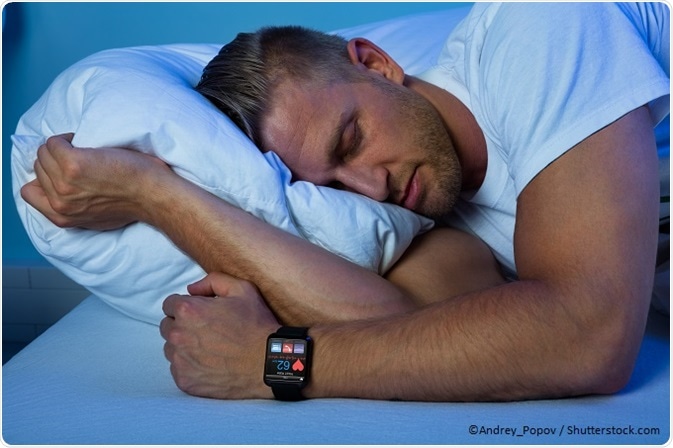Wearable sleep trackers monitor sleep patterns and provide insights to improve sleep quality. They are popular tools for better sleep health.
Sleep is vital for overall health and well-being. Many people struggle to get adequate rest, leading to various health issues. Wearable sleep trackers offer a solution by providing detailed data on sleep cycles, duration, and quality. These devices utilize sensors to track movements, heart rate, and, in some cases, blood oxygen levels.
With this information, users can identify patterns and make lifestyle adjustments to improve their sleep. Popular brands like Fitbit, Garmin, and Apple Watch offer a range of features to suit different needs. Investing in a wearable sleep tracker can be a step towards better sleep and overall health.

Credit: www.news-medical.net
What Are Wearable Sleep Trackers & Why You Need One Now
Wearable sleep trackers are popular. They help you understand your sleep. They provide insights into your sleep patterns. These devices are worn on your wrist or clipped to your clothing. They use sensors to monitor your movements and heart rate.
This data is then analyzed to give you a clear picture of your sleep quality. Let’s dive into the world of wearable sleep trackers.
Why Quality Sleep Is Your Hidden Superpower
Sleep is vital for health. It helps your body and mind recharge. Good sleep improves memory, mood, and concentration. Lack of sleep can cause many health issues. These include obesity, heart disease, and diabetes. So, tracking sleep can be very useful.
How Wearable Tech Revolutionized Sleep Tracking
Wearable technology is growing fast. Many people use fitness trackers and smartwatches. These devices track steps, heart rate, and more. They also track sleep. Wearable sleep trackers are part of this trend. They are easy to use and provide valuable data.
Here are some popular features of wearable sleep trackers:
- Sleep Stages: Track light, deep, and REM sleep.
- Heart Rate Monitoring: Measure your heart rate throughout the night.
- Smart Alarms: Wake you up at the best time in your sleep cycle.
- Sleep Insights: Provide tips to improve sleep quality.
Below is a comparison table of popular wearable sleep trackers:
| Tracker | Features | Price Range (USD) |
|---|---|---|
| Fitbit Charge 6 | Heart Rate, Sleep Stages, SpO₂, Smart Alarms, ECG, Stress Tracking | $130–$160 |
| Garmin Venu 3 | Sleep Stages, Heart Rate, SpO₂, HRV, Body Battery, GPS, Music Storage | $380–$420 |
| Garmin Index Sleep Monitor | Sleep Stages, Skin Temperature, SpO₂, HRV, Smart Alarms | $160–$180 |
| Oura Ring Gen 3 / 4 | Heart Rate, Body Temperature, Sleep Stages, HRV, Readiness Score | $250–$400 |
| Whoop 5 | Heart Rate, Sleep Stages, Strain & Recovery Metrics, HRV | Subscription-based ($30+/month) |
| Pixel Watch 3 | Sleep Stages, Heart Rate, SpO₂, Fitbit Integration, Smartwatch Features | $399–$429 |
| Galaxy Watch 7 | Sleep Stages, Heart Rate, SpO₂, AI Recovery, FDA-Cleared Detection | $399–$449 |
| OnePlus Watch 3 | Sleep Stages, Heart Rate, SpO₂, Snoring Detection, Stress Monitoring | $199–$249 |
Wearable sleep trackers are very useful. They help you understand your sleep patterns. They provide tips to improve sleep. Using them can lead to better health and well-being.

Credit: www.nytimes.com
How Wearable Sleep Trackers Work
Wearable sleep trackers are gadgets that help you understand your sleep patterns. They collect data while you sleep and analyze it. This helps you improve your sleep quality.
From Sensors to Sleep Stages: The Technology Inside
Wearable sleep trackers use various sensors to collect data. These sensors include:
- Accelerometers: Measure your movements during sleep.
- Heart Rate Monitors: Track your heart rate throughout the night.
- SpO2 Sensors: Measure your blood oxygen levels.
- Temperature Sensors: Record your body temperature changes.
The data collected is stored in the device. It is later transferred to an app or a computer for analysis.
Algorithms And Sleep Analysis
Algorithms process the collected data to provide insights. They analyze:
- Sleep Stages: Light sleep, deep sleep, and REM sleep.
- Duration: Total time spent sleeping.
- Sleep Quality: How restful your sleep was.
These algorithms use complex calculations to give accurate results. The results help you understand your sleep habits better.
Here is a simple table showing data types and their benefits:
| Data Type | Benefit |
|---|---|
| Movement Data | Identifies restless periods |
| Heart Rate Data | Monitors overall sleep health |
| Oxygen Levels | Detects breathing issues |
| Temperature | Adjusts sleep environment |
Using wearable sleep trackers can help you improve your sleep patterns. Better sleep leads to better health and well-being.
Surprising Benefits of Using a Wearable Sleep Tracker
Wearable sleep trackers are popular. They help people sleep better. They also provide useful data. Here are the key benefits of using these devices.
Experience Deeper, More Restorative Sleep
Sleep trackers monitor sleep patterns. They provide data on sleep stages. With this information, you can adjust your bedtime habits. This leads to better sleep.
Trackers wake you up during light sleep. This avoids groggy mornings. You start your day feeling refreshed.
Personalized Sleep Coaching Tailored to You
Wearable trackers offer personalized insights. These insights are based on your sleep data. You get tips tailored to your needs.
Sleep trackers track factors like room temperature, noise, and movement. These factors affect sleep quality. Personalized insights help you create a better sleep environment.
| Feature | Benefit |
|---|---|
| Sleep Stages Tracking | Adjust sleep habits for better rest |
| Smart Alarms | Wake up feeling refreshed |
| Personalized Tips | Improve your sleep environment |
In summary, using sleep trackers can greatly enhance sleep quality. Personalized insights and smart features make it easy to sleep better and wake up refreshed.
Best Wearable Sleep Trackers in 2025
Wearable sleep trackers are revolutionizing how we understand our sleep patterns. These devices help monitor sleep quality, duration, and disturbances. Many brands offer advanced features, making it easier to improve sleep hygiene.
Top-Rated Sleep Trackers You Can Trust
Several brands dominate the wearable sleep tracker market. Each offers unique features tailored to different needs.
- Fitbit Charge 6 (latest upgrade over Charge 5)
- Tracks sleep stages (deep, light, REM), heart rate, SpO₂.
- Battery lasts up to 7 days; comparable sleep-stage accuracy to Oura Ring Gen 3
- Requires Fitbit Premium for advanced insights and smart wake alarms.
- Garmin Venu 3
- Measures sleep stages, HRV, stress, Body Battery, and offers a Sleep Coach and nap detection.
- The battery lasts several days.
- Sleep-stage accuracy is mixed: some users praise it, others find it unreliable.
- Garmin Index Sleep Monitor (brand-new arm band)
- Worn on the upper arm, tracks sleep stages, skin temperature, SpO₂, HRV, and stress.
- Battery up to 7 days; supports smart alarms, women’s health tracking.
- Priced at ~$169.99/€169.99.
- Oura Ring Gen 3 / Gen 4
- Discrete ring form, tracks sleep stages, readiness, and recovery via temperature and HRV.
- Gen 3 praised for improving sleep habits.
- Whoop 5 (formerly Strap 4.0)
- Focused on advanced recovery and sleep metrics (strain, sleep debt), part of a subscription model.
- Still a top choice for athletes.
- Google Pixel Watch 3
- Combines Fitbit-powered sleep stage tracking, HR, and smartwatch features.
- Recognized in 2025 as a leading choice for Android users.
- Samsung Galaxy Watch 7
- Offers AI-driven recovery and accurate sleep insights, with FDA-cleared detection capabilities.
- OnePlus Watch 3
- Recent April 2025 release, 5-day battery, AMOLED display, tracks sleep, snoring, and provides a full health check.
Feature Face-Off: Which Tracker Is Right for You?
Comparing key features can help you choose the best sleep tracker. Here’s a breakdown of what each top model offers:
| Brand & Model | Sleep Stages | Heart Rate + SpO₂ | Battery Life | Unique Features |
| Fitbit Charge 6 | ✓ | ✓ | Up to 7 days | Smart alarm, Fitbit app ecosystem, budget-friendly |
| Garmin Venu 3 | ✓ | ✓ | 5–10 days | HRV, Body Battery, Sleep Coach, nap detection, GPS, music (smartwatch) |
| Garmin Index Sleep Monitor | ✓ | ✓ | Up to 7 days | Arm-worn comfort, skin temp, smart wake, women’s health |
| Oura Ring Gen 3/4 | ✓ | ✓ | 4–7 days (ring) | Discreet, readiness score, temperature trends |
| Whoop 5 | ✓ | ✓ | 5 days | Strain/recovery focus, sleep coaching, subscription-based |
| Pixel Watch 3 | ✓ | ✓ | ≈2 days | Fitbit integration with full smartwatch functionality |
| Galaxy Watch 7 | ✓ | ✓ | ≈2–3 days | AI recovery insights, FDA-cleared sleep disorder detection |
| OnePlus Watch 3 | ✓ | ✓ | 5 days | Budget-friendly Android choice, health check, snoring analysis |
Each wearable sleep tracker offers unique benefits. Choose based on your specific needs and preferences. Prioritize battery life, accuracy, and additional features to find the perfect match.
Integrating Sleep Trackers Into Daily Life
Integrating wearable sleep trackers into daily life can improve your sleep. These devices provide insights to help you achieve better rest. Here’s how to set up and interpret your sleep tracker.
Easy Setup Tips to Get Started Fast
Setting up your sleep tracker is simple. Follow these steps:
- Charge the device: Ensure your tracker is fully charged.
- Download the app: Install the companion app on your phone.
- Pair the device: Connect the tracker to your phone via Bluetooth.
- Configure settings: Adjust settings to suit your sleep patterns.
After setup, wear the tracker to bed. Make sure it fits comfortably. The device will monitor your sleep cycles throughout the night.
How to Read Your Sleep Data Like a Pro
Your sleep tracker collects various data points. Understanding this data is crucial.
| Data Type | Description |
|---|---|
| Sleep Stages | Shows light, deep, and REM sleep stages. |
| Sleep Duration | Total hours of sleep each night. |
| Sleep Quality | Overall quality based on sleep stages. |
| Heart Rate | Average heart rate during sleep. |
Use the app to view your sleep data. Look for patterns and trends. This information can help you adjust your sleep habits.
For instance:
- If you notice frequent awakenings, consider reducing caffeine intake.
- Consistent light sleep might suggest a need for a better mattress.
- Low REM sleep might indicate high stress levels.
Regularly reviewing your sleep data can lead to improved sleep quality. Make adjustments based on the insights provided by your sleep tracker.

Credit: www.nationalgeographic.com
Drawbacks to Consider Before Buying a Sleep Tracker
Wearable sleep trackers are increasingly popular. They promise better sleep insights. Yet, they come with certain challenges and limitations. Understanding these can help users make informed choices.
How Accurate Are Sleep Trackers Really?
Accuracy is one major concern with wearable sleep trackers. These devices use sensors to monitor sleep patterns. They track movements and sometimes heart rates. But they can’t always distinguish between light sleep and wakefulness. This can lead to inaccurate data.
Here’s a table to summarize the accuracy issues:
| Challenge | Detail |
|---|---|
| Movement Detection | May confuse restlessness with light sleep |
| Heart Rate Monitoring | External factors can affect readings |
| Sleep Stage Tracking | Not always reliable for deep sleep vs. light sleep |
Are Your Sleep Stats Safe? Privacy Explained
Privacy is another significant concern. Wearable sleep trackers collect personal data. This data includes sleep patterns, heart rates, and sometimes even location data. Users must be aware of how this data is used and stored.
Consider these privacy issues:
- Data Storage: Where is your data stored? Is it secure?
- Data Sharing: Who has access to your data? Can it be shared with third parties?
- User Consent: Are you fully informed about the data collection process?
Ensuring data privacy is crucial for user trust and security.
What’s Next? The Future of Wearable Sleep Tracking Is Smarter
The future of wearable sleep technology looks very promising. These devices are becoming more advanced and user-friendly. They help people monitor and improve their sleep patterns.
Innovative Features
Wearable sleep trackers are adding many innovative features. They can now measure your heart rate and breathing patterns. Some devices even monitor your blood oxygen levels. They offer detailed sleep stage analysis. This includes REM, light, and deep sleep.
Many devices now have smart alarms. These wake you up at the ideal time in your sleep cycle. This helps you feel more rested. Some trackers also include temperature sensors. They adjust your environment for better sleep.
Below is a table showing some innovative features:
| Feature | Description |
|---|---|
| Heart Rate Monitoring | Tracks your heart rate during sleep |
| Breathing Patterns | Monitors your breathing rate |
| Blood Oxygen Levels | Measures your blood oxygen saturation |
| Sleep Stage Analysis | Breaks down your sleep stages |
| Smart Alarms | Wakes you up at the best time |
| Temperature Sensors | Adjusts your sleep environment |
How Sleep Analytics Will Improve Health Outcomes
Wearable sleep trackers offer many potential health benefits. They help you understand your sleep patterns. This can improve your sleep quality.
Better sleep can boost your immune system. It can improve your mood and mental health. It can also increase your productivity and energy levels. These devices can help detect sleep disorders early. Early detection can lead to timely treatment.
Here are some potential health benefits:
- Improved sleep quality
- Boosted immune system
- Better mood and mental health
- Increased productivity
- Early detection of sleep disorders
Frequently Asked Questions
What Wearable Is Best For Sleep-tracking?
The best wearable for sleep-tracking is the Fitbit Sense. It offers advanced features like heart rate monitoring, SpO2 tracking, and detailed sleep stages.
Which Sleep Tracker Is Most Accurate?
The Fitbit Sense is often considered the most accurate sleep tracker. It monitors heart rate, sleep stages, and oxygen levels.
Do Wearable Sleep Trackers Work?
Yes, wearable sleep trackers work. They monitor sleep patterns, heart rate, and movements. Accuracy varies among devices.
Is A Sleep Tracker Worth It?
Yes, a sleep tracker is worth it. It helps monitor sleep patterns, improve sleep quality, and identify potential issues.
Conclusion
Wearable sleep trackers offer valuable insights into your sleep patterns. They help improve sleep quality and overall health. Easy to use and packed with features, these devices are becoming essential tools. Embrace this technology to enhance your well-being and enjoy a restful night’s sleep.
Invest in your health today.

A passionate tech blogger and the founder of Best Tech View, a dynamic platform dedicated to all things technology. With a keen interest in the tech, Ahmad strives to provide insightful and engaging content on the latest tech trends, and breakthroughs.
